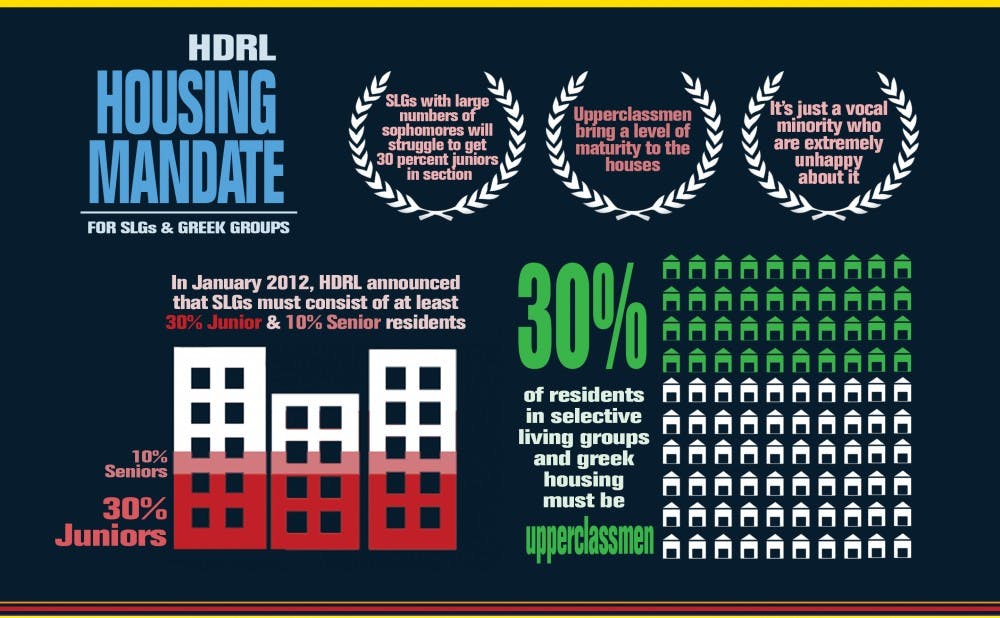Three years after the policy was announced, Housing, Dining and Residential Life will be enforcing the mandate that 30 percent of residents in selective living groups and greek housing be upperclassmen.
In January 2012, HDRL announced that SLGs—which officially encompasses greek and selective housing groups—must consist of at least 30 percent upperclassmen residents, 10 percent of who must be seniors. Fall 2015 will be the first semester that this composition will be enforced. After giving the groups a period to adjust to the policy, HDRL will begin to implement consequences for non-adherence—including the possibility that housing sections will be revoked. A number of students and SLGs have expressed concerns with the new policy enforcement, arguing that upperclassmen should be able to decide where they live.
“We feel it’s important to have an upperclassmen presence on Central Campus," Dean for Residential Life Joe Gonzalez said. "This provides opportunities that will have both a direct and indirect value for sophomores."
The delay between the announcement of the policy and its enforcement was intentional, Gonzalez said. HDRL wanted to give SLGs adequate time to adjust to the policy.
In 2012, some groups were already meeting the 30 percent requirement, but some groups had no senior residents and needed longer to adjust their housing patterns, he said.
“We told groups to start working towards it and now we can say we have expectations with consequences,” Gonzalez said. “Groups that don’t meet the quota will be placed on probation, and if they are on probation for two of three consecutive years, they will lose their house.”
Junior Zach Gorwitz, Duke Student Government vice president for residential life, said he was concerned that some SLGs would not be able to meet this requirement.
“Some of the SLGs with large numbers of sophomores will definitely struggle to get 30 percent [juniors] in section,” Gorwitz said. “The majority of SLGs are already in compliance, though.”
Current Duke housing policies require students to live on campus for three years, meaning generally only seniors have the opportunity to experience living in apartments in Durham.
"Although the new housing requirements are clear and HDRL’s goals are understandable, I believe they are unrealistic for many organizations on campus," said Junior Katie Chaplin, who has been involved in her Panhellenic sorority since she was a freshman. "HDRL administration needs to take into account the fact that not all selected living groups are structured the same and their housing models cannot be treated the same. Rather, each campus organization has individually unique processes for demonstrating and implementing top-down leadership that goes far beyond living in a unified section on Central Campus."
She added that upperclassmen should not be forced to live on Central Campus as a result of joining an SLG.
"I understand and agree with the need for each organization to demonstrate upperclassmen leadership, but HDRL must understand that this leadership and mentorship does not come from living in section," Chaplain said. "The leadership that they are looking for already exists and is rooted much deeper in the values that each campus organization is founded upon."
Gonzalez agreed that this policy may be inconvenient for some groups but felt the benefits of having juniors and seniors on Central Campus outweighed the concerns.
“The upperclassmen bring a level of maturity to the houses and their presence is important,” he said.
Although an upperclassman presence in section is important, Gorwitz said that he felt the groups would benefit from having autonomy over how they filled their house.
“We’re not thrilled with this but we understand the value. In the end, it will be a good thing for the Duke housing system,” he said. “It’s just a vocal minority who are extremely unhappy about it.”
Despite the complaints, Gonzalez said that he hoped the housing system will be attractive to seniors and that they will see the value of an increased upperclassmen presence on campus.
“We think this policy is reasonable and fair," he said. "It gives groups a level they can realistically reach."
An earlier version of this article stated that the newly enforced guidelines would require 30 percent of residents to be juniors and 10 percent to be seniors, rather than 30 percent juniors and seniors, 10 percent of who must be seniors. The Chronicle regrets the error.
Get The Chronicle straight to your inbox
Signup for our weekly newsletter. Cancel at any time.

